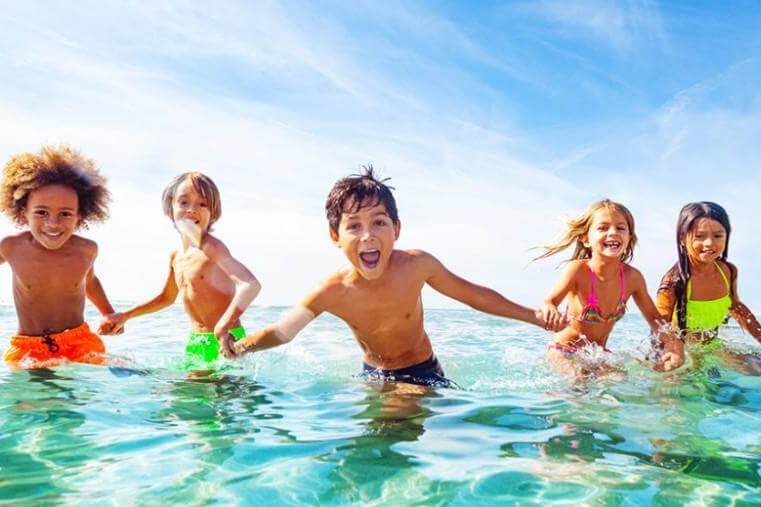Summer brings bright skies, warm days, and endless outdoor adventures for children. But as kids enjoy sunny playtime, it’s crucial for parents to ensure their safety. According to Dr. Taqdees Afreen, a pediatrician with Bayhealth Pediatrics in Milford, simple precautions can make all the difference between joyful memories and preventable injuries or illnesses. From protective footwear to proper hydration and sunscreen use, this guide covers all you need to know for safe summer play across all age groups.

Summer Safety Essentials for Outdoor Play
Protecting Little Feet with Proper Footwear
Flip-flops may be trendy, but they’re not ideal for outdoor adventures. Dr. Afreen recommends bump-toe sandals for younger children. These provide better protection for delicate feet—especially during activities like biking, scooter riding, or walking on hot pavement or sand.
Quick Tips:
- Avoid open-toed sandals or flip-flops for active play.
- Check playground equipment like slides and swings for heat before use.
- Opt for closed-toe shoes when riding bikes or scooters.
Sun Protection: Sunscreen and Clothing
Nothing puts a damper on summer like a sunburn. Proper sun protection is essential, especially for babies and toddlers.
How to Apply Sunscreen the Right Way
Dr. Afreen suggests using the “teaspoon rule”:
- 1 teaspoon for face, neck, and arms.
- 2 teaspoons for the torso (front and back).
Apply sunscreen 15-20 minutes before sun exposure and reapply every 2 hours. Use SPF 15 or higher and choose formulas with zinc oxide or titanium dioxide for infants.
Clothing as a Sun Shield
Infants under 6 months should not use sunscreen liberally. Instead, dress them in lightweight, breathable clothing that covers the skin. Add a wide-brimmed hat to shield their face from direct sun exposure.
Pro Tip: Avoid combination sunscreen-insect repellent products. If using both, apply sunscreen first, then repellent.
Hydration Matters: Keep Kids Cool and Hydrated
Water plays a key role in preventing heat exhaustion and dehydration, especially during outdoor activities.
Recommended Water Intake by Age
- Infants: Breast milk or formula only.
- Toddlers (1-3 years): 4 cups of water or milk daily.
- Children (4-8 years): 5 cups of hydrating fluids.
- Ages 8+: 7–8 cups of water per day (just like adults).
Avoid sugary drinks like soda and juice, which can harm teeth and provide unnecessary calories.
Signs of Dehydration in Kids
- Fewer wet diapers (in babies)
- No tears when crying
- Flushed or dry skin
- Irritability
- Muscle cramps and headaches
Bike, Scooter & Skate Safety: Always Wear Helmets
Every child on wheels—whether biking, skating, or scootering—should wear a properly fitted helmet, even for quick rides around the block.
Helmet Safety Guidelines:
- Ensure the helmet fits snugly and the straps are secure.
- Replace helmets after a crash or if damaged.
- Parents should wear helmets too—set the right example!
Also, teach basic traffic awareness and rules to kids:
- Look both ways before crossing streets.
- Stay on designated paths.
- Avoid busy roads and follow road signs.
Food Safety in the Summer Heat
Summer picnics and cookouts are fun, but improper food handling can lead to foodborne illnesses.
Tips for Safe Summer Eating:
- Refrigerate perishable items promptly.
- Avoid leaving food out in direct sunlight.
- Discard anything with odd smells or frothy residue (especially canned items).
Signs of Food Poisoning in Children:
- Diarrhea, nausea, and stomach cramps
- Fever or bloody stool (seek medical help)
- Numbness or weakness in the legs (seek immediate care)
If multiple family members feel ill, suspect a shared contaminated food source.
Special Summer Tips for Infants
Babies are particularly vulnerable to heat and sun exposure. Here’s how to protect them:
- Keep infants shaded at all times.
- Avoid going outdoors during peak heat hours (11 AM – 4 PM).
- Use fans or keep air-conditioning at a comfortable level indoors.
- Dress infants in breathable cotton fabrics.
Frequently Asked Questions:
Q1: At what age can I apply sunscreen to my baby?
A: Sunscreen is generally not recommended for babies under 6 months. Instead, protect them with clothing and shade. For older infants, use a small amount with zinc or titanium oxide.
Q2: How much water should a 5-year-old drink in summer?
A: Children aged 4–8 should consume about 5 cups of fluids daily, primarily water and milk. Avoid sugary drinks.
Q3: What are signs of dehydration in toddlers?
A: Look for dry lips, no tears when crying, few wet diapers, irritability, and tiredness. These may indicate dehydration.
Q4: Why is flip-flop footwear not ideal for outdoor play?
A: Flip-flops offer minimal protection. For running, biking, or hot surfaces, closed-toe sandals or sneakers are safer.
Q5: How often should sunscreen be reapplied?
A: Reapply sunscreen every 2 hours, or after swimming or excessive sweating.




